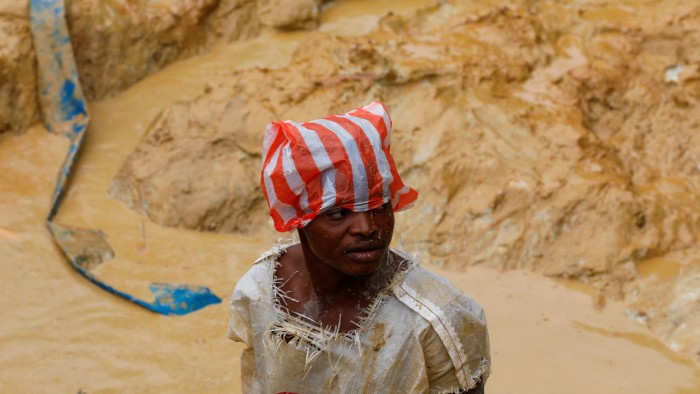Ghanaian cocoa farmers are abandoning beans for bullion in an illegal gold mining boom that has ravaged the country’s cocoa production and helped drive global chocolate prices to historic highs.
The cost of cocoa traded in New York trebled between early 2023 and the start of this year but price controls in Ghana, the world’s second-largest cocoa producer, have denied farmers that windfall. As a result, many are selling their farms to illegal miners who have decimated swaths of land and poisoned much of the country’s water supply.
The cocoa industry, civil society and a government-commissioned report all allege that the miners are backed by political elites.
Isaac Frimpong, a 31-year-old farmer, had designs on establishing his first farm after a decade of working for others. But when he visited the small tract of land he had leased with a 5,000 cedis ($320) deposit in January, he found it had been overrun by gold diggers.
“The land is unusable now,” said Frimpong, who recalled nearly coming to blows with the men who took his land for “galamsey”, the local term for the practice of illegal gold mining. The landowner has refused to return Frimpong’s deposit, which took him a year to cobble together.
“Galamsey is ruining our farmlands and livelihoods,” said Frimpong, who continues to work as a labourer on other people’s farms.

Galamsey’s insatiable rise is intensifying a crisis that saw cocoa yields in the west African country plunge 20 per cent last year. Crops in Ghana and Ivory Coast, which together grow more than half the world’s cocoa, have been dwindling since the 2020-21 season, pummelled by climate change, disease outbreaks and chronic under-investment.
The resulting global shortage has slashed chocolate makers’ margins and left consumers around the world eating smaller bars with new recipes that scrimp on the cocoa. Last month, executives from two of the world’s leading chocolate makers warned consumption could slow due to the high prices.
Cocoa futures traded in New York plunged from $10,300 to $8,500 per tonne on the fears last week, before recovering to $9,000 as exports from Ivory Coast slowed.
Galamsey is “the most malignant” of all the forces driving the crisis and all but irreversible due to the flooding and chemicals used by miners, said Antonie Fountain, managing director of the Voice Network, a non-profit focused on sustainability in cocoa.
“Anyone that goes up country sees it wherever they go. And it devastates every farm it touches,” Fountain said. “Once galamsey has been in your farms, the soil and water are a contaminated wasteland.”
The destruction in Ghana, Africa’s biggest gold producer, is a potent example of the knock-on effects caused by record-high gold prices, with an avalanche of traders buying up the precious metal in an effort to shield themselves from geopolitical turmoil and US President Donald Trump’s tariff threats.
Despite outcry from the industry and environmentalists, nothing meaningful has been done to fix the problem. In 2021, a government-commissioned report laid the blame for galamsey’s growth at the feet of “corrupt” regulators and ruling party officials.
“Galamsey has almost become like a drug cartel funded by people very close to power,” said Enoch Randy Aikins, an analyst at the Institute for Security Studies. “If you have party officials and influential people involved, it becomes very difficult for any government to crack the whip.”

The inaction has left the odds firmly stacked against cocoa farmers who decline to join the gold rush. As they grapple with neighbouring miners polluting their land and luring away workers, they are also being kneecapped by government regulations originally intended to protect them.
The Ghana Cocoa Board (known as Cocobod), which buys directly from growers and sells on to traders, has been paying farmers a third of what the beans fetch on the market via a mechanism that bases prices on the previous season.
It was designed to shield farmers from the worst of the lows, but Cocobod also makes opaque deductions for services such as providing pesticides and mass pruning — which the farmers say do not always materialise.
Cocobod and a spokesperson for Ghana’s president did not respond to requests for comment.

Even some of Ghana’s most gifted cocoa farmers are struggling with the corrosive effects of galamsey.
Frederick Owusu, 46, took home the “Best Farmer” award in his local district in eastern Ghana last year and, in January, rejected an offer of 450,000 cedis to sell his land to gold prospectors, believing he would earn more in the long term by farming. But with cocoa bringing poor returns, he plans to switch his focus this year towards goods sold on the free market, such as rice, palm fruit and animal husbandry.
“Cocoa farming is already tedious work,” Owusu lamented in his native Twi language through an interpreter. “And if you add all these problems together it means I’m not very happy to continue.”

Galamsey has existed for years but many Ghanaians realised the urgency of the crisis last year when the state-owned water company cut its clean water supply by 75 per cent in some regions, saying it could not handle the levels of chemicals being spewed by gold mining. One industry body has warned Ghana may have to start importing water if the situation doesn’t rapidly improve.
The charity WaterAid dubbed the pollution “ecocide” and a Ghanaian artist used the brown, murky water of the Pra river as paint. Miners have also torn up swaths of forest on land owned by indigenous communities.
Protesters took to the streets of the capital Accra as the emergency added to widespread resentment against former president Nana Akufo-Addo, whose deputy lost the presidential election in December. New president John Mahama has pledged a crackdown on illegal mining but is yet to provide any detailed plans.


Before flooding the land, miners pull it apart with expensive heavy-duty excavators, which are often bought with funds coming from government officials and their connections, the 2021 government-commissioned report said. The gold rush has also attracted private Chinese investors who have descended on Ghana’s mining towns.
As gold prices rise amid geopolitical uncertainty, a trickle of news about arrests of galamsey workers has done little to stop the surge into the industry.
Ghanaians in skilled professions such as carpentry, tailoring and even fashion design have ditched their jobs to take on the gruelling, and sometimes dangerous, work of digging for gold. These workers often wait for the first wave of miners to finish before descending to scavenge whatever gold is left behind.
“I was afraid when I started,” said Kwabena Samuel, 32, who has worked in a crew of six scavengers in Osino, a gold rush town in the east, since last year. “But you can’t steal and you have to work, otherwise hunger will kill you.”


Samuel quit jobs in construction and carpentry as work dried up and inflation pushed the costs of raising his 11-year-old son and three younger siblings beyond what he could afford. He now earns 2,000 cedis in a good month.
James Ayim, a member of the local assembly that governs the district containing Osino, once hoped galamsey could be stopped. Now, he says deploying security forces to arrest prospectors often fails since officers are susceptible to bribery.
Ayim believes the best protection Ghana could aspire to is better regulation of small-scale mining, since there is often an uptick in petty crimes when mining is curtailed.
“For the young men doing this, it’s about survival. Surface mining cannot be stopped but maybe it can be done responsibly,” he said.
Cartography by Aditi Bhandari and Janina Conboye; data visualisation by Keith Fray





